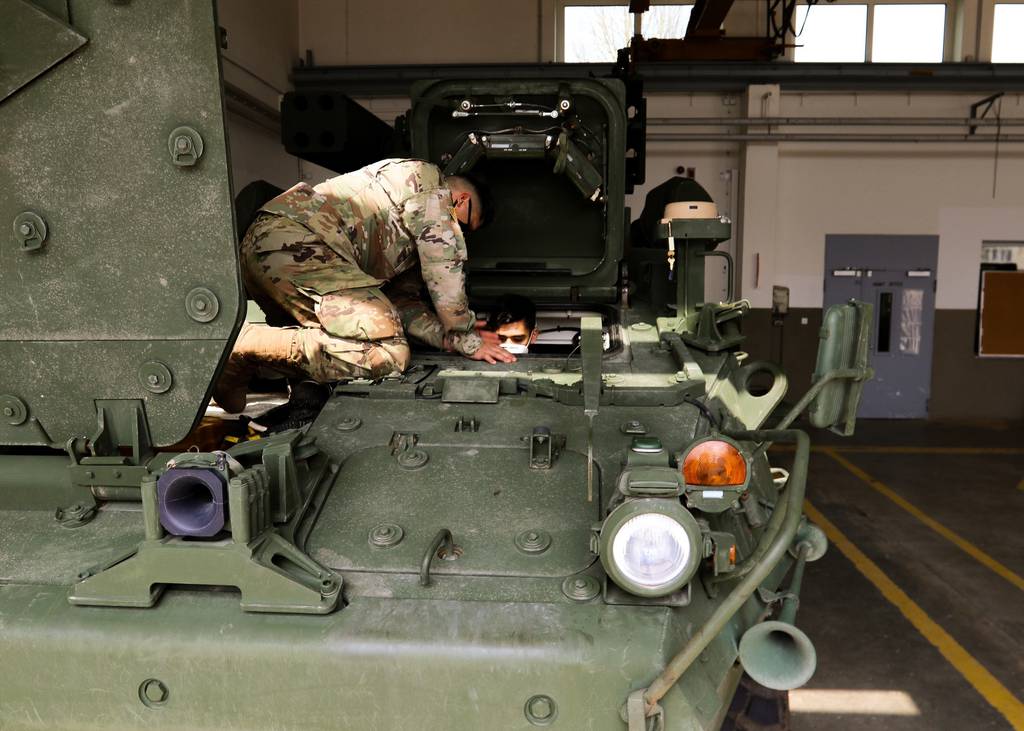WASHINGTON — The first platoon of the U.S. Army’s Maneuver-Short-Range Air Defense System arrived in Europe five months ago, and the first unit to receive the Stryker-based systems have now put them through their paces ahead of live-fire events and bigger exercises down the road, Lt. Col. Abraham Osborn, the head of 5th Battalion, 4th Air Defense Artillery Regiment, told Defense News in an Oct. 4 statement.
The M-SHORAD is a Stryker A1 combat vehicle-based system that includes a mission equipment package designed by Leonardo DRS. That package includes Raytheon’s Stinger vehicle missile launcher.
General Dynamics Land Systems is the lead integrator and received a $1.2 billion contract to build and deliver the system in October 2020.
The system was developed in record time, answering an urgent call in 2016 from U.S. Army Europe to fill the short-range air defense capability gap. The service received the requirement to build the system in February 2018. It took just 19 months from the time the service generated the requirement to the delivery of prototypes for testing in the first quarter of fiscal 2020.
Since the equipment arrived April 19, “we have focused primarily on driver’s training and crew training for the platoon,” Osborn said.
The Stryker “increases our maneuverability over varied terrain, [but] it requires a higher degree of training and communication between the driver and vehicle commander to operate safely,” he added.
While the M-SHORADs have been unable to participate in a major exercise (the systems arrived too late to join the annual exercise Defender Europe in 2021, the largest military drill on the continent), Osborn anticipates participation in Defender Europe 22.
Coming up “this week,” Osborn said on Oct. 4, the unit is conducting a Stinger missile live-fire demonstration in northern Germany.
“This is the first ever live-fire of the M-SHORAD system in Europe, however this is just a demonstration and not a full certification of crews,” Osborn noted.
The M-SHORAD will participate in Saber Strike in the second quarter of fiscal 2022 where it will support the 2nd Cavalry Regiment.
The unit is also in the planning stages of a full platoon gunnery certification with the M-SHORAD in the third quarter of FY22.
While it’s too early to provide soldier feedback from the unit using the systems in Europe, according to Osborn, Maj. Gen. Brian Gibson said what he’s hearing is soldiers “want them faster and they want more of them.” Gibson is in charge of the Army’s air and missile defense modernization efforts.
The Army is planning a larger-scale operational test of the M-SHORAD in the third quarter of FY23, Maj. Gen. Robert Rasch, the program executive officer for Army missiles and space, told Defense News in a recent interview. But before that happens, the Army must field the rest of the battalion in the 2022 time frame and then give members time to prepare for the operational test, he said.
That time would include developing doctrine, tactics, techniques and procedure as well as letting the test community review the system within the context of fighting and protecting the maneuver force, Rasch said. The Army conducted an early operational assessment last year, he added.
“This event will be more like: Can the unit with this system do the overall mission set, which is to protect the maneuver force and maneuver with the maneuver force that it is designed to do?” Rasch said. “So we’ll just take a little time to make sure that we give that unit the time behind the wheel of that system and get the confidence before we go into that test activity.”
The Army will field 144 systems to four battalions beginning this year, followed by an enduring capability for additional battalions.
Future variants of the system will include other kinetic interceptors and a directed-energy capability that will not only defend against unmanned aircraft systems and manned aircraft but also rockets, artillery and mortars.
Jen Judson is an award-winning journalist covering land warfare for Defense News. She has also worked for Politico and Inside Defense. She holds a Master of Science degree in journalism from Boston University and a Bachelor of Arts degree from Kenyon College.








